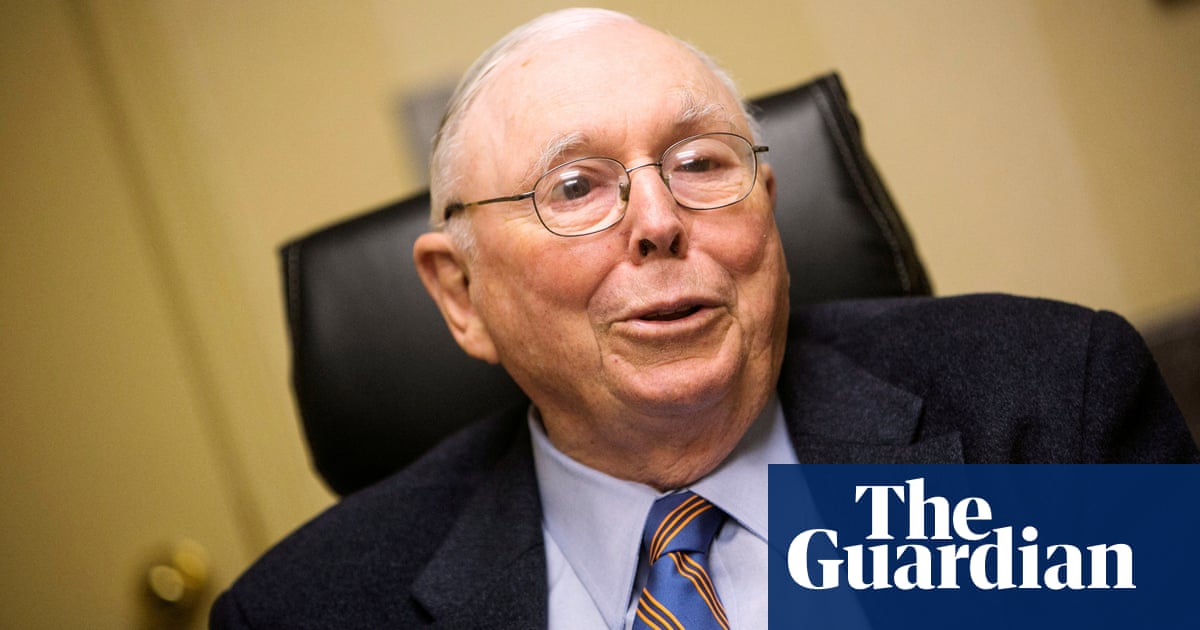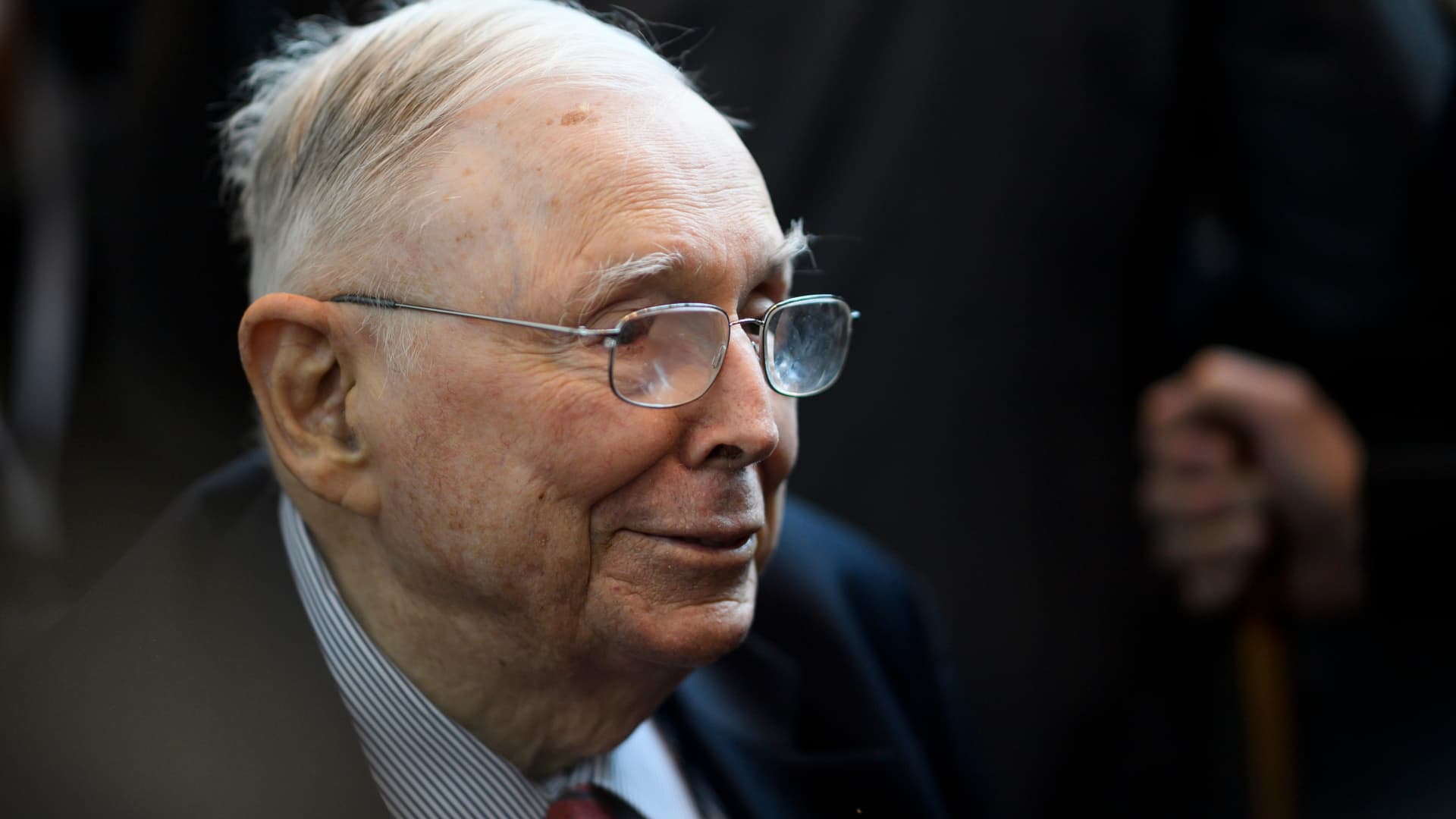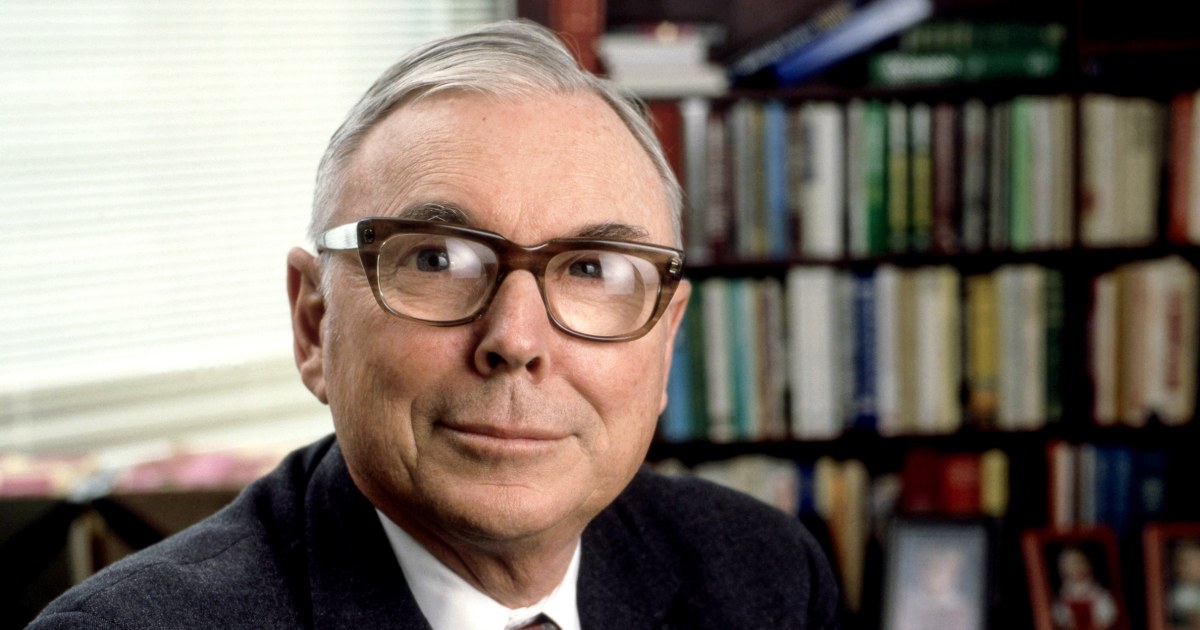Washingtonpost
Charlie Munger, dry-witted sidekick to Warren Buffett, dies at 99
T.Brown3 months ago
Charlie Munger, a champion of common-sense investing who forever altered the finance world as the top adviser and dry-witted sidekick to Warren Buffett, the most successful financier in history, died Nov. 28 at a hospital in California. He was 99. His death was announced by Berkshire Hathaway , the Omaha-based investment company he helped lead with Buffett. The firm did not give a cause or say exactly where he died. Initially prospering as a lawyer in Los Angeles, Mr. Munger met his future business partner in 1959 at a dinner party in their mutual hometown of Omaha. To Mr. Munger, a Harvard Law School graduate seven years his senior, Buffett cheekily advised that “law was fine as a hobby,” but that Mr. Munger could do better for himself as an investor. Within two decades, Mr. Munger would become chief lieutenant to Buffett at Berkshire Hathaway. Mr. Munger attained a net worth of about $2.7 billion, according to Forbes magazine , and until his death remained irrevocably linked to Buffett. In turn, Mr. Munger’s advice and presence helped make Buffett one of the world’s wealthiest men and expand Berkshire Hathaway from a business worth tens of millions of dollars into one valued at around $785 billion. From itsbeginning, their partnership was marked by disciplined focus on a technique known as “value investing.” That strategy — based on the ability to identify greatly undervalued stocks early on and the commitment to hold shares for the duration — made the Buffett-Munger pair seem initially like outliers in a profession that seldom rewarded patience. But in time, value investing cemented Buffett’s reputation as the “Oracle of Omaha.” Whitney Tilson, a New York-based fund manager, compared today’s community of “value investors” to a religion. “Buffett is the pope,” Tilson told The Washington Post in 2012. “Munger is the senior archbishop.” Mr. Munger’s legal mind and knowledge of taxes and business operations were widely credited with complementing Buffett’s more purely financial skills. “A lot of people with high IQs are terrible investors because they’ve got terrible temperaments,” Mr. Munger once said, according to the book “Poor Charlie’s Almanack,” which collected so-called “Mungerisms.” “You need to keep raw, irrational emotion under control. You need patience and an ability to take losses and adversity without going crazy.” Mr. Munger and Buffett formed a deep friendship before becoming formal business partners in 1978, when Mr. Munger became vice chairman of Berkshire. Two of his holdings — Blue Chips Stamps and, later, Diversified Retailing — eventually merged with Berkshire Hathaway, and Mr. Munger served as chairman of the Berkshire subsidiary Wesco Financial Corp. With Mr. Munger onboard, Berkshire Hathaway moved into its biggest growth period as an investor. Its holdings included See’s Candies, Illinois National Bank and The Washington Post Co.
His investment strategy
Until Mr. Munger joined him, Buffett pursued an investment strategy that was dominated by the philosophy of Benjamin Graham, who had once been his professor at Columbia University’s business school. Graham’s philosophy of value investing emphasized buying low-priced stocks in undervalued companies — which were identified through balance sheet analysis — and selling those stocks when prices bounced back to their market potential. Mr. Munger and Buffett pioneered a different style: investing in solid, established companies at what, over the long term, would prove to be very reasonable prices. “Charlie shoved me in the direction of not just buying bargains, as Ben Graham had taught me,” Buffett told Forbes magazine in 1996. “This was the real impact he had on me. It took a powerful force to move me on from Graham’s limiting views. It was the power of Charlie’s mind. He expanded my horizons.” In near-daily phone conversations, Buffett typically proposed his investment ideas to Mr. Munger, who acted as the skeptic. After discussions, they would typically put investment possibilities into three baskets: Yes, No or “Too tough to understand.” Mr. Munger always gave Buffett the final call. During the 1980s and 1990s, Buffett and Mr. Munger combined Graham’s investment strategy with what some publications later called “one-decision theory.” In the latter, an investor researches and picks good growth stocks or companies, buys them and aims to hold them forever. Buffett and Mr. Mungermade large investment bets during that time, including Coca-Cola, Geico insurance, Wells Fargo banking, Gillette razors and Dexter shoes. The strategy differs wildly from the fast-trading action on Wall Street or at many hedge funds and private equity firms, which tend to buy companies or stocks for relatively short periods of time before turning around and selling the assets. As arguably the most successful investors of their time, Buffett and Mr. Munger helped expand and popularize their alternative approach. But they made the task of finding undervalued companies look easy. Mr. Munger strongly believed that those investors missed out on the power of compound interest — interest that accrues on the initial principal and the accumulated interest of a principal deposit, loan or debt. He often carried tables to help him illustrate to others the compound rate of return — how a 13.4 percent compound annual interest, for example, can grow a $1 investment into $43 over 30 years. In solid companies, Mr. Munger and Buffett saw their love of compound interest play out in the form of franchises immune to inflation and with potential for ongoing growth and cash flow. That cash flow filters to investors in the form of dividends and stock appreciation. Buffett and Mr. Munger often didn’t trust accountant and banker models and chose to recast financial statements based on their own analysis. Their research helped them avoid flash-in-the-pan stocks — and find well-managed companies with competitive advantages in their products. The men never sold their stake to reap the cash reward. They viewed Coca-Cola as a steady dividend producer with an international footprint of ongoing sales. They said they would hold the shares forever. “One advantage of Coca-Cola is that it’s available almost everywhere in the world,” Mr. Munger said during a 1994 speech at the University of Southern California business school. “The worldwide distribution setup — which is slowly won by a big enterprise — gets to be a huge advantage. ... And if you think about it, once you get enough advantages of that type, it can become very hard for anybody to dislodge you.” Mr. Munger and Buffett kept the bulk of their own net worth tied up in Berkshire stock, convincing their shareholders, as Buffett wrote, that “we eat our own cooking.” They aimed to attract long-term shareholders to Berkshire, not short-term traders. Berkshire Hathaway’s annual meetings in Omaha each year stood in sharp contrast to those of many publicly traded companies. Such meetings are required by law and are often uninteresting formalities. By contrast, Mr. Munger and Buffett turned their annual meetings and related programs into a celebrationand sort of Chautauqua intellectual assembly. Thousands of investors flock each year to the event, where Mr. Munger’s curmudgeonly temperament was often on full display from a stage, where he and Buffett fielded questions from investors about the economy, markets, investments and other topics. The two men were often harsh critics of traditional investment banks and financial models popular on Wall Street for predicting future earnings and write-downs. Mr. Munger and Buffett carried particular disdain for the “efficient market theory” in economics, which holds that the market is always perfectly efficient. Their success was often based on finding inefficiencies in the market and exploiting them by using math, science, psychology and logic. “Learning has never been work for me. It’s play. I was born innately curious,” Mr. Munger told investors in 2010. “If that doesn’t work for you, figure out your own damn system.”An intro to business
Charles Thomas Munger was born in Omaha, where his father was a lawyer, on Jan. 1, 1924. The younger Munger grew up 200 yards from Buffett’s home and worked in Buffett’s grandfather’s grocery store in the lean years after the Depression, according to Forbes. “It provided a very desirable introduction to business,” he later said of that job. “It required hard, accurate work over long hours.” After serving as an Army Air Forces meteorologist during World War II, he used family connections to enter Harvard Law School without an undergraduate degree. Mr. Munger graduated in 1948, moved to Los Angeles and joined a prestigious law firm that represented wealthy entrepreneurs such as the oil magnate J. Paul Getty. Despite what seemed like a promising professional start, Mr. Munger’s personal life was traumatic. His first marriage, to Nancy Huggins, ended in divorce, and he lost his home in the process. Then his son, Teddy, died of leukemia at 9 in 1955. Friends said Mr. Munger would visit his son daily during the boy’s prolonged hospital stay and walk back to his office, weeping. In 1956 he married Nancy Barry Borthwick, whom he had met on a blind date, and credited her with being his ballast over the years. She died in 2010. He had two daughters from his first marriage and four children from his second. A complete list of survivors was not immediately available. In 1962, Mr. Munger and six others formed the Los Angeles-based law firm of Munger, Tolles and Olson, which has represented Berkshire Hathaway. That same year, Mr. Munger started his own investment advisory firm, Wheeler, Munger & Co. “Like Warren, I had a considerable passion to get rich,” he told business writer Janet Lowe in the book “Damn Right! Behind the Scenes with Berkshire Hathaway Billionaire Charlie Munger” (2000). “Not because I wanted Ferraris — I wanted the independence. I desperately wanted it.” He started partnering with Buffett in the 1960s, sometimes spotting key West Coast investments for Berkshire Hathaway such as See’s Candies. He stepped down from being an active partner in his law firm in 1965. Until 1975, he continued operating his investment firm, which for the most part performed nearly four times better than the Dow Jones Industrial Average during the same period. While Buffett led a simple life and piled up his wealth before pledging it to Bill Gates, Mr. Munger gave away much of his money directly to institutions such as Planned Parenthood, Good Samaritan Hospital in Los Angeles and the Stanford University law school. He served on boards of organizations including the private Harvard-Westlake School, a private institution in North Hollywood, and Costco Cos., the warehouse-style retailer. Buffett was a Democrat, and Mr. Munger was a registered Republican. But he joined Buffett as an ardent supporter of population control and abortion rights. As one Berkshire Hathaway annual meeting came to a close in 2011, a shareholder asked Buffett and Mr. Munger what they want to be remembered for in 100 years. Buffett quipped that he wanted to be remembered as old. Mr. Munger quoted his father. The man had advised his young son that everyone should seek to be remembered “for a fortune fairly won and wisely used.”Read the full article:https://www.washingtonpost.com/obituaries/2023/11/28/charles-munger-dead-berkshire-hathaway/
0 Comments
0







/cloudfront-us-east-2.images.arcpublishing.com/reuters/7ZQWXJXD2FOIXCERPKAYFYE3AY.jpg)
/cloudfront-us-east-2.images.arcpublishing.com/reuters/ODKR3FUVGBOVLKHC5LLEW3ZJKM.jpg)










